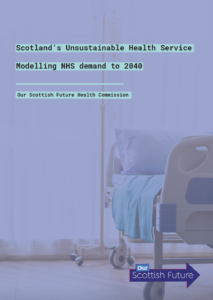
Professor David Kerr
Professor David Kerr led the National Framework for Service Change in the NHS in Scotland in 2005 and is chair of Our Scottish Future's Health Commission
THIS week, Labour’s shadow Health Secretary Wes Streeting dropped a truth bomb on Britain’s National Health Service. “It is not the envy of the world, it is not delivering the quality of care that any of us want and, unless it changes, it’s not going to survive,” said the man who will, in all likelihood, soon be running England’s NHS.
These are stark words. They are also correct. Britain’s rapidly ageing population is set to put immense strain on our model of health and social care. Without radical reform of services, it cannot carry on. And what goes for England goes for Scotland too.
Today, the think-tank Our Scottish Future is publishing modelling which aims to set this out in numbers. Figures show that the number of people aged over 75 in Scotland will rise from 469,000 in 2021 to 774,000 by the early 2040s. If the health system carries on as it operates now, the number of hospital “bed days” that will be required by the over 75s will rise from 2.59 million a year to 3.9 million a year in 2040. We calculate this would mean Scotland would need an extra 3,500 beds – along with 2,300 extra doctors and 17,000 extra nurses to staff them.
Given the country’s financial constraints, this is unsustainable. It shows why NHS leaders in Scotland are right to argue that reform of the NHS and our social care system is required.
This can be done. Mr Streeting was commenting from Singapore, another country whose population is ageing rapidly. Its own healthcare system is increasing capacity in primary care to try to deal with demand. It’s also innovating, using medical technology such as Apps to help people monitor and manage their own health, helping them avoid acute care. Efforts to innovate are also happening in Scotland but we need to accelerate the reform process, with an urgent national debate on the steps that need to be taken.
We believe a 21st century patient-centric health and social care system should be built upon the “3Ps” design principles of prevention, precision and personalisation. By reforming our health care system so it is designed to prevent disease, with personalised care and precise treatment for people throughout their lives, we can help the NHS cope with the surging demand it will face over the coming decades whilst improving the populations’ health outcomes. This model will require leveraging new technology. It should also involve the sharing of best practice across all the nations of the UK. Healthcare is not a competition: we need to work together across the UK health systems.
The NHS is our best loved national institution. To ignore the reforms needed is to neglect it. If it’s to become sustainable for the long-term, it is time to embrace the necessity of change.
This article featured in the Times Scotland









